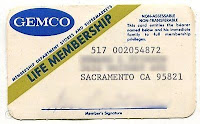But first, some context. As noted in my previous post, I felt forced by a business downturn in 1983 to resign from Smith Tool and take an IT manager position at Gemco, a now defunct membership department store, then owned by Lucky Stores. This returned me to my retail roots.
A Prescient Prediction
The interview summary, dated October 18, 1983, is quite interesting, especially in one paragraph where Harris said:
We need to recognize the changes that will come in the next decade due to the spread of advanced telecommunications. It is likely that 50% to 70% of basic hardgoods and commodities will be purchased from home, eliminating the need for store visits. However, apparel and other fashion merchandise will continue to be purchased in store environments, because of the psychological need to “go shopping.”
How wrong he turned out to be! –FS, 3/15/93 (10 years later!)
But little did I know, 1993 was the year that the U.S Congress passed a law to commercialize the Internet, and it was also the year that Tim Berners-Lee invented the World Wide Web. And, one year later, Jeff Bezos founded Amazon. But it took another two decades before a worldwide pandemic pushed B2C e-commerce for certain categories of goods to the levels that Peter Harris predicted nearly 40 years earlier.
Lesson Learned: Keep an Open Mind
So what predictions are out there that might seem far-fetched today but could eventually come into realization?
- The Metaverse. There are many breathless predictions these days about “the metaverse,” a virtual world where people and organizations can live and interact in a persistent and immersive 3D environment, where they can own virtual property, trade virtual goods, and be educated or entertained. Some argue that the metaverse already exists with various gaming platforms. Others think it is being overhyped by social media companies, such as Facebook (now branded as Meta) that are otherwise out of ideas about how to keep people engaged on their platforms in order to target them for advertisements.
- Non-Fungible Tokens. NFTs have been a hot market over the past year, with sales of digital art, secured by NFTs on a blockchain, trading for thousands or millions of dollars. The fact that any piece of digital art can be saved with a mouse right-click makes it difficult to understand what exactly an NFT denotes in terms of ownership. The recent and rapid decline in the value of various NFTs confirms to skeptics that they are nothing more than the 21st century equivalent of Tulipmania.
- Cryptocurrencies. Digital currencies using cryptography, such as Bitcoin, are built using blockchain technology. In contrast to fiat money, such as the US Dollar, they are not backed by a central government but are decentralized, permissionless, and virtually impossible to corrupt. Advocates predict they will replace fiat money, or at least exist alongside it, providing a hedge against inflation and very low transaction costs compared to traditional currency exchanges. At this writing, there is a collapse in cryptocurrency markets, confirming the view of crypto-critics that the whole thing is one big bubble.
Sometimes, predictions are not wrong. They just take longer than we think to be realized.
Footnote
Update, May 22, 2022
Peter, I'm sure you don't remember me, but I interviewed you in 1983 at Gemco. I just wrote a blog post about your prediction about E-commerce. [Link to this post.] Let me know any feedback. --Frank
Frank, I am absolutely blown away to hear from you and read of your perspective, highlighted of course by your absolutely amazing record keeping mention of something I said many years ago. While I think 30 years early doesn't count as anything beyond being impracticably thoughtful, I was honored and hugely appreciative to be recognized. Your article is fascinating and I am now following you so that I might observe and learn from your thinking and musings on other topics. That you have tracked me down on LinkedIn and shared it means a lot. The appropriate comments are "way cool," "awesome" or maybe even "wowza." Thank you so very much. I'd be interested to hear a bit more than is visible on LinkedIn about what you are doing now if you have time to share. --Peter
Update, Aug. 8, 2022
Update, June 3, 2024
Here is another remarkable prediction from 1964, along the same lines, this one from Arthur C. Clarke, Here, he predicts the rise of the internet, remote working, and even telemedicine. In fact, we have not yet fully achieved his vision.


